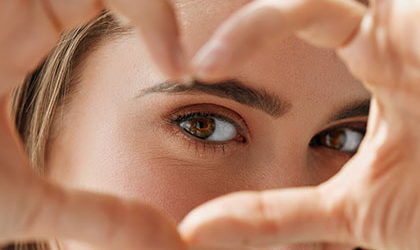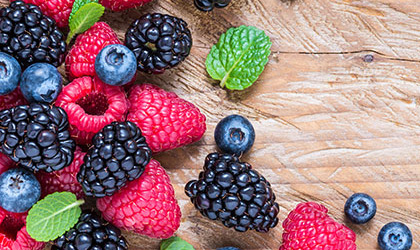
Many people will experience floaters at some point in their life. According to the National Eye Institute, ‘almost everyone develops floaters as they get older’.1 But floaters can also develop from a young age, particularly in short-sighted individuals.
Although there are many ways to prevent the onset of eye floaters, emerging research suggests a diet rich in micronutrients – most notably, zinc, l-lysine, and vitamin C – may improve vision by reducing eye floaters in individuals who already struggle with them.
Here, we take a look at the new evidence, which promises to be transformational for sufferers.
What are eye floaters?
Eye floaters are specks or tiny dots in your vision that dart away as soon as you try to look at them. Comprised of the vitreous of the eye, most floaters are perfectly normal and don’t require treatment. They can, however, be hugely frustrating and make it difficult to see in some instances.
Although floaters are unique to the individual, they often take on the following shapes:
-
Rings
-
Cobweb shapes
-
Irregular shapes
-
Small lines
-
Shadowy specks or dots
How can I prevent eye floaters?
As with any area of health, prevention is always better than cure. And there are many ways to minimise the risk of developing floaters by simply protecting your overall eye health:
-
Stop smoking
-
Wear sunglasses outside
-
Get lots of sleep and rest your eyes regularly, especially from screens
-
Use protective eyewear if needed
-
Eat a varied and balanced diet
What vitamins and nutrients can help eye floaters?
In some cases, it's just not possible to prevent eye floaters, and up until recently, there's been no widely available treatment for them. Unfortunately, most people are told to live with them, irrespective of how irritating and frustrating they can be.
But now, new research suggests increasing your intake of micronutrients, like l-lysine, vitamin C and zinc, may improve vision by supporting the reduction of floaters.2
Given the promising evidence emerging on l-lysine – as well as the understanding that vitamin C contributes to the normal collagen formation for the normal function of blood vessels and zinc contributes to the maintenance of normal vision – these findings aren’t all that surprising2. Together, these nutrients are positioned to support many areas of health, including vision.
Want to learn more about supplementing with l-lysine, vitamin C, and zinc? Have a chat with one of our expert Nutrition Advisors. Just click the chat button located at the bottom right-hand of our website.
Alternatively, head over to our dedicated Eye Health Hub for more information on looking after your vision.
References
-
Floaters National Eye Institute. (2021). from https://www.nei.nih.gov/learn-about-eye-health/eye-conditions-and-diseases/floaters
-
Micronutrient blend said to improve vision by reducing eye ‘floaters,’ says study. (2021). https://www.nutraingredients.com/Article/2021/10/26/Micronutrient-blend-said-to-improve-vision-by-reducing-eye-floaters-says-study?utm_source=newsletter_daily&utm_medium=email&utm_campaign=27-Oct-2021&cid=DM984226&bid=1749968272
Related Posts
Disclaimer: The information presented by Nature's Best is for informational purposes only. It is based on scientific studies (human, animal, or in vitro), clinical experience, or traditional usage as cited in each article. The results reported may not necessarily occur in all individuals. Self-treatment is not recommended for life-threatening conditions that require medical treatment under a doctor's care. For many of the conditions discussed, treatment with prescription or over the counter medication is also available. Consult your doctor, practitioner, and/or pharmacist for any health problem and before using any supplements or before making any changes in prescribed medications.

Keri
Keri Filtness has worked in the Nutrition Industry for 19 years. She is regularly called upon for her professional comments on health and nutrition related news. Her opinions have been featured by BBC3, Prima, Vitality, The Mirror, Woman’s Own and Cycling Weekly, amongst others. She has also worked one to one with journalists, analysing their diets and health concerns and recommending changes and additions, where appropriate.






